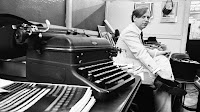If you want to understand 2023 New York, read a novel published in 1987. Everything Tom Wolfe wrote about the media creating their own “narratives” and sleazy activist heightening and exploiting social divisions for their own benefit is even more true today than it was then. His nonfiction classic Radical Chic should also be required reading before anyone watches Bradley Cooper’s Leonard Bernstein movie. It is therefore the perfect time for a Tom Wolfe documentary. With zeitgesty timeliness Wolfe would appreciate, Richard Dewey delivers one in Radical Wolfe, which opens this Friday in New York.
Rather fittingly, Radical Wolfe is somewhat “adapted” from Michael Lewis’s magazine article. Today, the relevancy of ink-on-paper magazines is almost non-existent, but they were an important voice when Wolfe started writing for Esquire. In archival interviews, Wolfe recounts how it all almost didn’t happen, due to severe writer’s block on his first big piece, but by sketching out his notes for some other writer to flesh out, he ended up writing what would become known as The Kandy-Kolored Tangerine Flake Streamline Baby.
Dewey and Lewis address Radical Chic head-on, focusing on the Bernstein family’s embarrassment to have their radical activism exposed for public ridicule. Former Black Panther Jamal Joseph tries characterizes Radical Chic as an attempt to belittle and minimize their efforts to make positive social change. Sadly, former Black Panther Alex Rackley was not available for comment, because he was tortured and executed in 1970, by other Panthers who suspected him of being a police informant.
Dewey’s talking heads arguably miss the full significant and prophetic legacy of Bonfire of the Vanities, even though the film includes commentary from a genuine “Master of the Universe,” Peter Thiel. Anyone who read the story of Sherman McCoy’s legal misadventures would have heard deafening echoes in the Rittenhouse trial and other media circuses over the past three years.
One thing everybody is dead right about: no major media publication today would have the guts to publish a contrarian like Wolfe. Even the frankness of The Right Stuff would get him cancelled. The brutally honest depiction of racial politics in The Bonfire of the Vanities would be a non-starter. It is a sad fact our culture no longer values culture and it is openly hostile to free expression.
Without question, Niall Ferguson most trenchantly and successfully explains Wolfe’s significance as an observer and interpreter of American society. In many ways, we view the late 20th Century through the prism of terms Wolfe coined, like “The Me Decade.” Nobody says it outright in Radical Wolfe, but the truth is we need Tom Wolfe more now than we did while he was living.
Dewey’s doc could have been more, but it definitely prompts viewers to revisit Wolfe’s wry wit and sly genius. It also sports a lithely buoyant jazz-influenced score, composed by Alex Mansour and featuring Ennis Harris on alto and Josh Plotner on clarinet and reeds. Recommended as a pretty good film (until a better one comes along), Radical Wolfe opens Friday (9/15) at the IFC Center.

